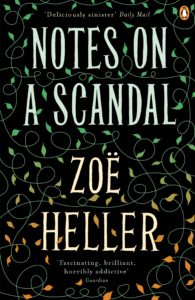Books
Paula Hawkins: the best troublesome women in literature
There are so many ways in which women are troublesome. We’re too fat. Too thin, too young, too old, too solitary. Not solitary enough. We raise our voices, we take up too much space. We drink, smoke, dance, curse, laugh too loudly. We are killjoys. We enjoy ourselves too much. We flaunt our curves. Let ourselves go. We are bossy, bitchy, strident. We nag. We just won’t listen. We won’t stop talking. We persist. (We can’t win.)
In literature as in life, I find myself drawn to women both troubled and troubling. I wrote about them in The Girl on the Train and have done so again in Into the Water, creating a cast of characters who, simply by living their lives and telling their truths, have disturbed the order of things. No wonder then that some of my favourite literary characters might fall into the troublesome category too: heroines and villains, they all – in ways subtle, outrageous or downright murderous – flout the rules society lays down for them.
 Take Lady Macbeth. Fiercely and fatally ambitious, seizing and refusing to relinquish her husband’s intimation of greatness, she is the one who goads her husband to act – and she is the one who bears the lion’s share of the opprobrium (he is tragic, she is evil). Ultimately, Lady Macbeth’s ambition brings her low: despite her pleas to the spirits to instill in her a manly dose of “direst cruelty”, she finds she has no stomach for slaughter (“who would have thought the old man to have so much blood in him?”). And it is the news of the killing of another woman, Lady MacDuff, and of her children, that drives her to the brink.
Take Lady Macbeth. Fiercely and fatally ambitious, seizing and refusing to relinquish her husband’s intimation of greatness, she is the one who goads her husband to act – and she is the one who bears the lion’s share of the opprobrium (he is tragic, she is evil). Ultimately, Lady Macbeth’s ambition brings her low: despite her pleas to the spirits to instill in her a manly dose of “direst cruelty”, she finds she has no stomach for slaughter (“who would have thought the old man to have so much blood in him?”). And it is the news of the killing of another woman, Lady MacDuff, and of her children, that drives her to the brink.
In Les Liaisons Dangeureuses, the deliciously wicked Marquise de Merteuil learns – by the age of fifteen, so she claims – to play the hand that society had dealt her. “I already knew the role I was condemned to,” she says, “namely to keep quiet and do what I was told.” While she was doing that, she listened, she observed, and she learned to wield expertly the tools at her disposal – her beauty, her intelligence and her sexuality – in order to attain power.
Some of these women may perhaps be less villainous than we have been led to believe, although that makes them no less troublesome. In Wide Sargasso Sea Jean Rhys gives us a Bertha Mason (aka Antoinette Conway) to admire and to pity. This Bertha is so much more than the exotic temptress/violent alcoholic/threat to Jane’s health and happiness – this is a woman married off to an Englishman she barely knows, a man who does not love her, and who despises her in spite of (and because of) her beauty. Taken to England and imprisoned at Thornfield, it is little wonder she ascends into madness in the attic.
 And so to the (complex, flawed) heroine. Offred, the shrewd and thoughtful narrator of Margaret Atwood’s groundbreaking feminist dystopia The Handmaid’s Tale, protects her sanity by committing small acts of defiance in the face of tyranny. Offred’s rebellion starts quietly: she makes eye contact when she is not supposed to. She contemplates theft without actually stealing anything. But then her transgressions escalate: Offred reads. She plays scrabble. She has sex, and not with the man to whom she has been assigned. Even worse, she enjoys the sex. In the face of every attempt to erase her personhood, to reduce her to a two-legged womb, Offred resists.
And so to the (complex, flawed) heroine. Offred, the shrewd and thoughtful narrator of Margaret Atwood’s groundbreaking feminist dystopia The Handmaid’s Tale, protects her sanity by committing small acts of defiance in the face of tyranny. Offred’s rebellion starts quietly: she makes eye contact when she is not supposed to. She contemplates theft without actually stealing anything. But then her transgressions escalate: Offred reads. She plays scrabble. She has sex, and not with the man to whom she has been assigned. Even worse, she enjoys the sex. In the face of every attempt to erase her personhood, to reduce her to a two-legged womb, Offred resists.
Beautiful Bathsheba Hart from Zoe Heller’s Notes on a Scandal is a rather trickier customer. Naïve and wilful, or wilfully naïve? Entering into a sexual relationship with a fifteen-year-old student at the London comprehensive at which she teaches, Sheba puts at risk her job, her marriage, her family, her liberty. And what a conundrum she poses for society (and particularly for the tabloid press): this sexual predator is an attractive woman, this victim is a hot-blooded male. Sheba comprehensively muddies the waters.
Who are your favourite troublesome women from literature? Let us know in the comments below!



Please note: Moderation is enabled and may delay your comment being posted. There is no need to resubmit your comment. By posting a comment you are agreeing to the website Terms of Use.